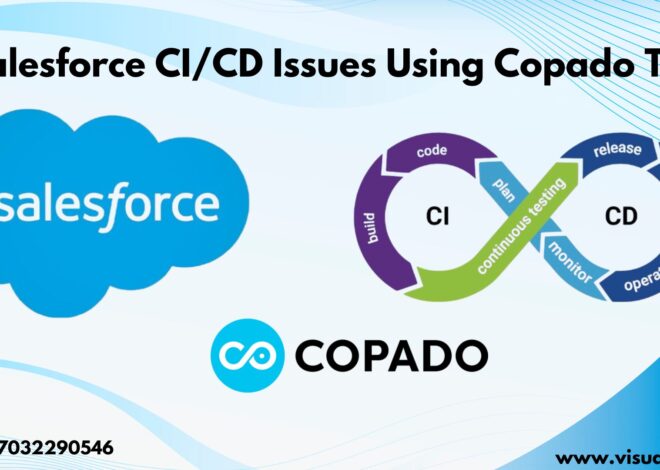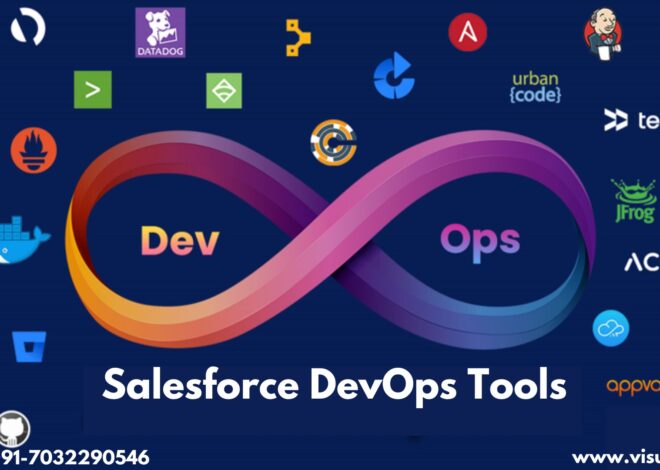Introduction:
Salesforce DevOps Training has become an essential platform for organizations to streamline their customer relationship management (CRM) processes. However, as businesses grow, managing Salesforce development lifecycles becomes increasingly complex. This is where DevOps steps in to enhance efficiency, collaboration, and delivery timelines. By integrating development and operations, DevOps revolutionizes how teams manage Salesforce implementations and updates. Let’s explore how DevOps improves Salesforce development lifecycles and discover actionable tips for optimizing the process.
Understanding DevOps in Salesforce Development
When applied to Salesforce, it emphasizes automation, collaboration, and continuous delivery. The goal is to create a streamlined development lifecycle, allowing teams to build, test, and deploy changes efficiently.
Key Features of DevOps in Salesforce:
- Version Control: Ensures that all team members work on the latest codebase.
- Continuous Integration and Deployment (CI/CD): Enables frequent and reliable releases.
- Collaboration: Promotes effective communication between developers and operations teams.
Challenges in Traditional Salesforce Development
Before integrating DevOps, Salesforce development often faced several challenges, including:
- Lack of Collaboration: Development and operations teams working in silos led to miscommunication.
- Manual Processes: Manual deployment methods were error-prone and time-consuming.
- Delayed Releases: Without automation, teams struggled to meet deadlines.
- Difficult Rollbacks: Reverting changes in traditional setups was cumbersome and risky.
These hurdles not only slowed down development but also increased operational risks and cost inefficiencies.
How DevOps Transforms Salesforce Development Lifecycles
Accelerated Development and Deployment
DevOps introduces automation tools that eliminate repetitive manual tasks, such as data migration and deployment scripts. Teams can deploy updates faster and more reliably.
Benefits:
- Streamlined deployment pipelines.
- Reduced time-to-market for new features.
- Enhanced productivity through automated workflows.
Improved Collaboration Across Teams
DevOps fosters a culture of collaboration, ensuring all stakeholders—from developers to testers—are on the same page.
Key Practices:
- Regular stand-up meetings to align goals.
- Shared dashboards for tracking project progress.
- Open communication channels for faster issue resolution.
Enhanced Quality Assurance
Automated testing tools validate changes in Salesforce configurations and code, reducing the likelihood of bugs.
Outcomes:
- Increased confidence in deployments.
- Consistent user experience.
- Minimized post-deployment issues.
Better Version Control
With DevOps, every change is logged and managed in version control systems. This transparency ensures accountability and simplifies rollback processes.
Advantages:
- Clear visibility of all code changes.
- Easy collaboration between distributed teams.
- Faster recovery from errors with versioned backups.
Continuous Monitoring and Feedback
DevOps integrates monitoring tools to track application performance post-deployment. Teams can gather feedback and make necessary adjustments in real time.
Impact:
- Proactive issue resolution.
- Improved application stability.
- Informed decisions for future enhancements.
Best Practices for Implementing DevOps in Salesforce
Adopt CI/CD Pipelines
A robust CI/CD pipeline is the backbone of DevOps. It enables continuous integration and delivery, ensuring that changes are tested and deployed seamlessly. Salesforce DevOps Certification
Tip: Use tools like Jenkins or Azure DevOps for automated pipelines in Salesforce projects.
Use Version Control Systems
Version control tools like Git allow developers to track changes, collaborate effectively, and revert updates if necessary.
Tip: Regularly review and clean up branches to avoid clutter.
Embrace Automated Testing
Incorporate testing frameworks that support Salesforce environments, such as Apex tests or Selenium for UI testing.
Tip: Include both unit and integration tests in your DevOps strategy for comprehensive coverage.
Prioritize Security
With increased automation and integration, maintaining security is critical. Use tools to scan for vulnerabilities and enforce secure coding practices.
Tip: Implement multi-factor authentication (MFA) in deployment pipelines.
Leverage Analytics and Monitoring
Real-time monitoring provides insights into deployment success and application performance. Use these analytics to refine future workflows.
Tip: Set up automated alerts for performance anomalies.
Foster a DevOps Culture
Cultural transformation is key to successful Salesforce DevOps implementation. Encourage team members to embrace collaboration, continuous learning, and shared accountability.
Tip: Organize workshops and training sessions to build DevOps expertise within the team.
Tips for a Smooth Transition to DevOps in Salesforce
- Start Small: Begin with a pilot project to test DevOps practices and refine workflows.
- Invest in Tools: Choose tools that align with your Salesforce environment and team needs.
- Provide Training: Equip your team with the skills required to adopt DevOps methodologies.
- Monitor Progress: Continuously measure the impact of DevOps on your development lifecycle. Salesforce DevOps With Copado Training
- Encourage Feedback: Use input from team members to improve processes.
Key Tools for DevOps in Salesforce
- Copado: A native Salesforce DevOps platform offering end-to-end automation.
- Gearset: Simplifies deployments with its intuitive interface and robust features.
- AutoRABIT: Focuses on continuous delivery and automated testing.
- Jenkins: A versatile CI/CD tool that integrates well with Salesforce projects.
- Bitbucket: Provides seamless version control and collaboration features.
The Future of DevOps in Salesforce Development
As organizations increasingly rely on Salesforce for business-critical functions, the demand for DevOps in Salesforce development will continue to grow. DevOps not only accelerates the development lifecycle but also improves software quality, scalability, and team efficiency.
Future trends may include:
- AI-driven automation for faster deployment.
- Enhanced integration of DevOps tools with Salesforce.
- More sophisticated monitoring and analytics solutions.
Conclusion
DevOps is a game-changer for Salesforce development lifecycles, addressing common challenges like inefficiencies, poor collaboration, and quality issues. By implementing DevOps practices and leveraging the right tools, organizations can achieve faster, more reliable Salesforce deployments.
Visualpath a leading institute in Hyderabad, offers Comprehensive Salesforce DevOps Online Training to help professionals excel in agile development and deployment practices. Our Salesforce DevOps Training With expert-led courses cover essential concepts, tools, and hands-on projects to ensure a practical learning experience.
Enroll for a Free Demo
Call us: – +91-9989971070
Course Covered:
Salesforce, DevOps, Copado, Deployment tools, Jenkins, Testing, Automation, Version control, Agility, Reporting
Visit: https://visualpath.in/online-salesforce-devops-training.html
Join Us WhatsApp: https://www.whatsapp.com/catalog/919989971070/




